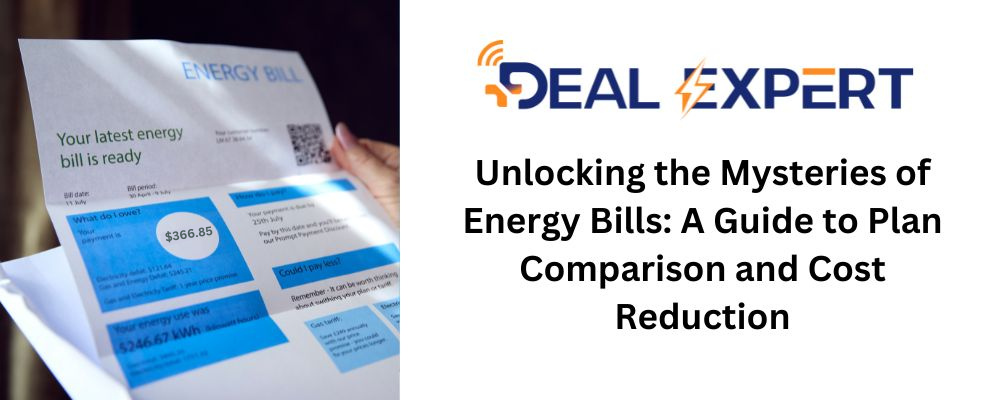
Energy bills are a notable expense for many households, and the process of selecting the most suitable energy plan can seem daunting. However, with the correct insights and resources, it’s possible to demystify this process and achieve significant savings. This guide will reveal the intricacies of energy bills, how to compare different plans, and strategies for effective cost-cutting.
- Understanding Your Energy Bill
To initiate savings and compare energy plans effectively, it’s crucial to comprehend your current expenses.
Charge Breakdown: Energy bills generally consist of supply charges (energy generation costs), network charges (energy transportation costs), and retail charges (provider’s service fees).
Usage Insights: Analyze your bill to identify your energy consumption patterns, especially during peak times which may incur higher costs.
Tariff Types: Ascertain whether you’re on a fixed or variable tariff, as this will influence how market fluctuations impact your bill.
- Assessing Your Energy Consumption
Identifying the most advantageous plan requires a precise evaluation of your energy needs.
Usage Review: Examine past bills to estimate your monthly energy consumption and consider any forthcoming changes, such as new appliances, that could modify this usage.
Energy Efficiency: Assess your home’s energy efficiency and potential enhancements that could decrease overall usage.
Lifestyle Factors: Reflect on your peak energy usage times—time-of-use rates might offer savings if your highest consumption coincides with off-peak periods.
- Navigating Energy Plan Options
Armed with a clear understanding of your requirements, you can start searching for a more beneficial plan.
Provider Comparison: Utilize online comparison tools to evaluate the rates, terms, and customer satisfaction of various energy providers.
Discounts and Incentives: Seek out plans that provide discounts for prompt payments, dual-fuel options, or renewable energy incentives.
Contract Considerations: Contemplate the plan’s flexibility, including contract terms, exit fees, and penalties for changing providers.
- Understanding Tariffs and Charges
Grasping the structure of energy tariffs and charges is essential for selecting the most suitable plan.
Fixed vs. Variable Tariffs: Fixed tariffs secure your rate for a specified duration, shielding you from price hikes; variable rates may adjust with the market.
Single-rate vs. Time-of-use: Single-rate tariffs maintain a consistent rate throughout the day, whereas time-of-use tariffs fluctuate based on energy consumption times, often offering lower rates during off-peak hours.
Standing Charges: These daily fees are incurred regardless of energy usage; comparing these is vital, particularly for low-usage households.
- Engaging in Negotiations with Providers
Engage with energy providers to negotiate a more favorable deal.
Rate Matching: If you discover a lower rate elsewhere, inquire if your current provider can match it.
Loyalty Leverage: If you’ve been a long-term customer, use this loyalty as a bargaining chip; providers may present a better offer to retain you.
Term Discussions: Sometimes, contract terms are as significant as the rate itself. Ensure they align with your needs through open discussions.
- Reducing Consumption and Enhancing Efficiency
Minimizing energy costs involves more than selecting the right plan; it also encompasses reducing consumption.
Energy-Efficient Appliances: invest in energy-efficient appliances that consume less power.
Smart Home Technology: Implement smart thermostats and lighting systems for more efficient energy management.
Behavioral Adjustments: Simple habits, such as switching off lights when not needed and slightly lowering the thermostat in winter, can accumulate substantial savings.
- Routine Plan Evaluation and Adaptation
As energy requirements and market offerings evolve, it’s imperative to consistently review your plan.
Annual Check-ups: Regularly reassess your energy plan to confirm it still meets your needs.
Market Awareness: Stay informed about energy market developments that could influence prices and offers.
Proactive Approach: Be prepared to switch plans or providers if a more suitable deal arises.
Finding the Best Plan
By grasping your energy consumption, critically comparing plans, negotiating with providers, and utilizing energy efficiently, you can markedly decrease your energy bills. The essence of cost reduction lies not only in securing the lowest rate but in finding a plan that aligns with your specific energy needs and usage habits. Empower yourself with this knowledge to make informed decisions that benefit your household and your wallet.
This strategic approach to energy bill management will aid in conserving funds and deepening your comprehension of the energy sector, leading to more informed and advantageous decisions.
Deal Expert vs. Doing It Yourself: What’s the Smarter Way to Switch Utility Plans?
Img Link: https://www.pexels.com/photo/gray-and-black-power-transmission-station-236089/ Let’s be honest—switching electricity, gas, or broadband...
Read MoreYour Step-by-Step Guide to Comparing & Finding Gas Providers
We live in a world where we compare everything: airfares,...
Read MoreLet’s start saving on your Broadband too!
We offer a free Broadband comparison service for all households too!
You can always speak to one of our experts ?

Samantha Robertson
Solutions Expert
1300 087 011
Frequently Asked Questions
What is the best electricity plan for me?
Every household is different, and there are lots of ways you can tailor your electricity plan. Deal Expert provides up to date energy comparison, price comparison, and energy deals from retailers so you can make an informed decision. It also important to consider whether you want to pay your bills monthly or quarterly depending on your needs. It is always a good time for a bit of exploration and comparison, as you could save hundreds, start today by Deal Expert providers!
How long will it take to switch providers?
Once you’ve confirmed your details with Deal Expert, you’ll be moved over to your new provider within 3-4 weeks, but it depends on the provider and state. Finding a cheap energy deal and confirming your Deal Expert takes only a few minutes. Following that, you have a 10 Business Day ‘cooling off’ period. If you change your mind during this time, you can cancel the switch through Deal Expert and nothing changes. Your new provider will also handle all of the paperwork.
How do I know this company is above board if I've never heard of them?
The Australian energy regulator ensures that every single supplier follows the same rules and regulations, so all Australians have a fair chance of finding an energy company to suit their needs. This is especially important for those who want smaller, lesser-known providers because they can trust in the fact that these companies will be held accountable by law if something goes wrong with their service.
Do I need to cancel my Direct Debit?
When you decide to close your account with your current provider, the company will send you a final bill and the company cancels the direct debit after taking the final payment. If there are any funds in credit on your previous plan, they should notify you so they can transfer these back into your bank account or send me the money via cheque.
Are there any hidden costs?
No, our service is completely free for all customers. This covers everything from visiting our website or calling our call centre in Australia to Deal Expert providers online at the click of a button. We are here to provide you with competitive deals and services.
Is the service from Deal Expert free?
Yes. it is completely free to Deal Expert’s customers. We get paid a commission by your new gas and electricity provider.
How does Solar work?
Solar Panels are made up of many solar cells, which convert sunlight directly into electricity. A photovoltaic (PV) module is a packaged connected assembly of typically 6×10 photovoltaic solar cells but may have as many as 72 cells. Solar panels generate electricity when light shines on the array of panels. The amount generated depends upon how much power or energy the sun provides to the area where they are mounted.
Can you connect my energy if I am moving house?
Yes, we can compare & connect you to a retailer of your choice. Connections usually require at least one business day notice, there may be a connection fee passed through to you. This is not from us; this is charged from the distributor & will be applied to your first energy bill.
When I switch providers will my gas or electricity be interrupted?
There will not be any interruption to your supply of electricity or gas. This is because they will continue to be supplied by the same energy distributor. All that really changes is the name of the energy retailer that issues your energy bills.


